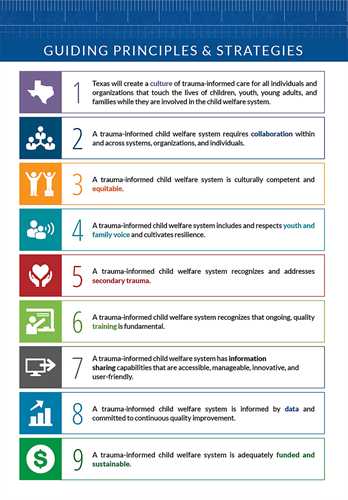Organizational Assessments
The key to creating and sustaining a trauma-informed and trauma-responsive child welfare system is adopting and nurturing a culture that integrates knowledge, belief, behavior, values, and goals affecting every level of service and care for the children and families who experience it. The policies and practices of child and family serving organizations should acknowledge that children, youth, young adults, and families in the child welfare system have experienced trauma, and may continue to experience trauma, and that the systems, practices, and programs that serve them should be trauma-informed and aim for equitable outcomes.
Developing a culture begins with a review of the current practices and policies being utilized to assess children and families and comparing them to a trauma-informed model. Also, considering life experiences and cultural backgrounds is key to fully understanding how trauma affects each individual, family, or community. A Trauma-Informed Organizational Assessment (TIOA) tool can help an organization evaluate implementation of trauma-informed care and identify areas of policy, practice, and programming on which to build and areas for improvement.
The Statewide Collaborative on Trauma-Informed Care (SCTIC) reviewed existing TIOAs and identified eight core areas of focus: Policies & Procedures, Environment, Services, Leadership, Staff, Consumer-Organization Relationship, Cultural Competence/Diversity, Partnership/Outreach. (Note, some TIOAs do not contain all eight areas of focus.) Many of the TIOAs include manuals to help with administering the assessment and tool kits to assist with interpreting the findings. All TIOAs included in this list are available at no cost.
The SCTIC compiled a list of TIOAs to help organizations with implementation of trauma-informed practices and policies. This information was gathered from multiple sources; SCTIC members and the Children’s Commission cannot guarantee the accuracy, reliability, or completeness of the information or the effectiveness of utilizing the TIOA. The SCTIC and Children’s Commission do not endorse any one TIOA tool. This list is intended to serve as a non-exhaustive list of TIOAs as the field continues to change and evolve regarding trauma-informed practices.
Links to the individual TIOAs are provided on the document for each TIOA. The TIOA documents are up to date as of March 2021.
Trauma-Informed Agency Assessment Version 1.4
This 35-item, validated assessment is directed primarily at children’s behavioral health agencies. Its development was heavily influenced by systems of care theory and incorporated the voices of families. In addition to surveys for agency staff, surveys are also available for youth and families.
Trauma-Informed Program Self-Assessment Scale
Applicable to human services agencies and programs, this 44-item, validated assessment includes surveys for administrators, providers, and survivor-consumers. The developers created a companion document to supplement the scale, and a revised version of the scale is also available. This scale has been adapted by a number of entities.
Program Fidelity Scale Version 1.3
The goal of this assessment, which is a revised version of the Trauma-Informed Program Self-Assessment Scale, is to gauge the extent to which a program or agency has developed a culture of trauma-informed care. The assessment includes 16 items, each with a subset of indicators. The assessment includes an instruction guide.
Organizational Self-Assessment: Adoption of Trauma-Informed Care
This 34-item assessment, created by the National Council for Community Behavioral Healthcare, allows for participation from leadership, supervisors, practitioners, consumers, and support staff. The assessment is geared toward organizations that provide behavioral health services, but it has been adapted for use in primary care settings. The assessment is designed for a variety of sources for data collection, including interviews with leadership, staff, and clients; review of clinical records, policy documents and formal surveys; and in-person observation.
Tre-SIA Self-Assessment
This 50-item self-assessment geared to any organization can be completed by an individual or as a team-based activity. The TIOA assesses Leadership and Culture, Trauma-Informed Care/Response Structure, Policies and Processes, Employee Skills, and Tools and Resources. The assessment also aims to help organizations map their scores, provide recommendations from each response, and develop an action plan that includes organizational policies and procedures.
NCFH Trauma-Informed Organizational Assessment
This assessment was created by The National Center on Family Homelessness to address homelessness. The 135-item self-assessment is designed to be completed by all staff members in the organization, including direct care staff (full time, part-time, and relief), supervisors, case managers, clinicians, administrators (e.g., program managers, directors, executive directors, etc.) and support staff (e.g., office support, maintenance, kitchen staff, etc.). It includes a detailed user’s guide, how-to manual to create organizational change. Note: This assessment includes Three Adapted Assessments.
Trauma Responsive School Implementation Assessment
This assessment was created for school administrators and staff by the Treatment and Services Adaptation Center for Resilience, Hope, and Wellness in Schools, in collaboration with the Center for School Mental Health. The 35-item evidence-informed self-assessment was created using the RAND/UCLA Modifies Delphi Approach to efficiently and quickly identify strengths and weaknesses in trauma response policies within schools.
Trauma-Informed System Change Instrument Organizational Change Self-Assessment
Created by the Southwest Michigan’s Children’s Trauma Assessment Center (CTAC), this validated 19-item self-assessment is designed for individual agency members in the child welfare system. This assessment tracks changes at a service provider level and asks individuals to assess their agency as their individual trauma-informed operations.
Trauma-System Readiness Tool
This 46-item self-assessment is designed to be administered to multiple informants across all organization levels within child welfare agencies, including caseworkers, supervisors, managers, and administrators. It is a part of the larger Trauma-Informed Child Welfare Practice Toolkit that includes a number of resources for child welfare systems. This assessment was developed to align with the Essential Elements of Trauma-Informed Child Welfare resource developed by the National Child Traumatic Stress Network (NCTSN).
Trauma-Informed Juvenile Court Self-Assessment (TI-JCSA)
This validated assessment was created by the National Child Traumatic Stress Network (NCTSN) for juvenile court systems. It is designed to assess the level at which court systems attain eight essential elements, outlined by the NCTSN, that represent aspirational standards for the operations of juvenile justice systems. It is designed to be completed by a self-assessment team and contains resources for system improvement.
Standards of Practice for TIC
This 51-item assessment was designed to help organizations, systems, and agencies implement trauma-informed care. The Standards of Practice were developed and reviewed by a workgroup that included family members, youth, and individuals with lived experience in trauma-informed care as well as providers from different fields of practice. The assessment is designed to be used by multi-level teams within organizations.
Trauma-Sensitive School Checklist
This 26-item checklist was developed to be used by school systems to assess their level of trauma-sensitivity. It is designed to help foster a school environment that enables students to build caring relationships and succeed academically. The checklist is designed to be completed by multiple team members within a school system.
Complete List of TIOAs


